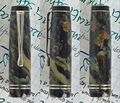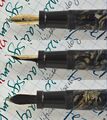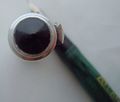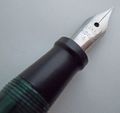Differenze tra le versioni di "Atlantica/en"
| Riga 1: | Riga 1: | ||
| − | <noinclude></noinclude> | + | <noinclude></noinclude>According to Letizia Jacopini the brand was used by the Milan company ''"Fabbrica Italiana di Penne Stilografiche - La Italianissima di Giuseppe Olivieri"''. The trademark, however, was deposited in the [[1931]] ({{Marchio|43857}}) by ''Giacomo Capella'', also in Milan, year that we assume, in the absence of more detailed results, as the beginning of the brand. The origins of the company are therefore somewhat uncertain, and the identification with the brand [[Italianissima]] far from obvious. |
The production saw well made laminated [[safety]] models marked ''Atlantica'', with hard rubber versions whose production is attributed to [[Montegrappa]]. The production of the '30s and '40s is characterized by the use of bright colors [[celluloid]] with the logo printed on the body. The initial '30s production seems to prefer the [[button filler]] while that of the 40's the [[lever filler]]. | The production saw well made laminated [[safety]] models marked ''Atlantica'', with hard rubber versions whose production is attributed to [[Montegrappa]]. The production of the '30s and '40s is characterized by the use of bright colors [[celluloid]] with the logo printed on the body. The initial '30s production seems to prefer the [[button filler]] while that of the 40's the [[lever filler]]. | ||
Versione delle 20:05, 10 apr 2019
According to Letizia Jacopini the brand was used by the Milan company "Fabbrica Italiana di Penne Stilografiche - La Italianissima di Giuseppe Olivieri". The trademark, however, was deposited in the 1931 (Reg. Gen. N. 43857) by Giacomo Capella, also in Milan, year that we assume, in the absence of more detailed results, as the beginning of the brand. The origins of the company are therefore somewhat uncertain, and the identification with the brand Italianissima far from obvious.
The production saw well made laminated safety models marked Atlantica, with hard rubber versions whose production is attributed to Montegrappa. The production of the '30s and '40s is characterized by the use of bright colors celluloid with the logo printed on the body. The initial '30s production seems to prefer the button filler while that of the 40's the lever filler.
Available material:

























